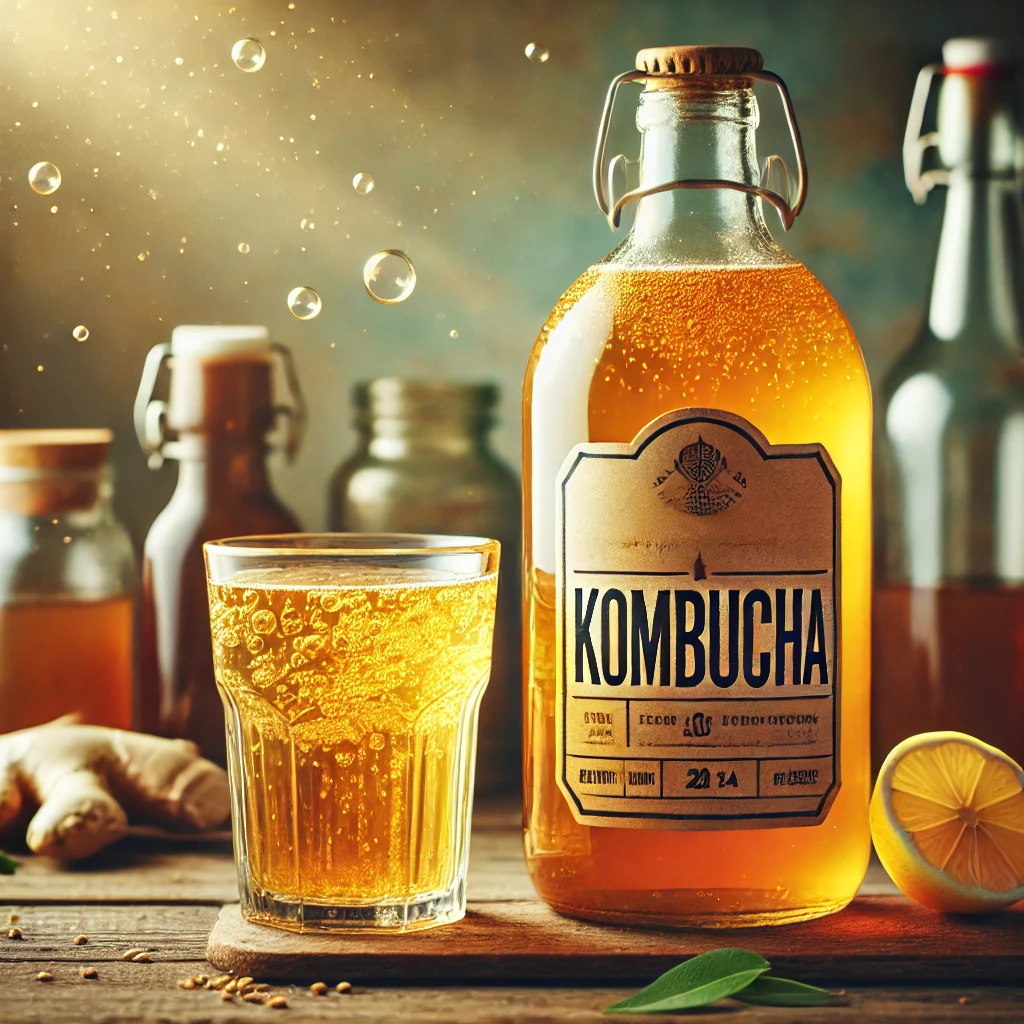The global kombucha market has witnessed remarkable growth in recent years, driven by factors such as increasing consumer awareness regarding the health benefits associated with kombucha consumption, such as improved digestion, boosted immune systems, and detoxification properties, which are driving demand. Additionally, the rising trend of healthier beverage options and the shift towards natural and organic products are further fueling market growth. Furthermore, the availability of a wide range of flavors and variants catering to diverse consumer preferences is expanding the consumer base. Moreover, the growing emphasis on sustainability and eco-friendly production methods in the beverage industry encourages the adoption of kombucha, as it is often perceived as a more environmentally friendly option than traditional carbonated soft drinks.
Kombucha, a fermented tea beverage, has gained significant popularity worldwide due to its health benefits, probiotic properties, and natural ingredients. The market has seen tremendous growth, driven by rising consumer awareness about gut health, functional beverages, and clean-label products. With innovation in flavors and ingredients, the kombucha industry is expanding beyond traditional markets, attracting a broader consumer base.
Kombucha Market Size and Growth
The global kombucha market is experiencing rapid growth, with increasing demand from health-conscious consumers. According to market research, the industry is expected to grow at a CAGR of over 19.4% in the coming years. The expansion of the beverage industry, coupled with the shift towards natural and organic drinks, is a key driver of this growth.
- Health and Wellness Trends: Consumers are increasingly opting for functional foods and beverages that offer digestive health benefits. Kombucha’s probiotic content supports gut health, making it a preferred choice among health-conscious individuals.
- Rise in Vegan and Organic Lifestyles: The surge in demand for plant-based and organic products has contributed to the kombucha market’s expansion. Many brands are offering organic, non-GMO, and low-sugar options to meet consumer preferences.
- Innovation in Flavors and Ingredients: The introduction of new flavors such as ginger, turmeric, mixed berries, and adaptogenic herbs has attracted a wider audience. Functional ingredients like collagen, CBD, and superfoods are also being incorporated into kombucha beverages.
- Increasing Availability in Retail and E-Commerce: Kombucha is now readily available in supermarkets, specialty health stores, and online platforms, making it more accessible to a global audience.
- Rising Popularity of Fermented Beverages: The growing interest in fermented foods and beverages, driven by their digestive and immune-boosting properties, has positively impacted the kombucha market.
Challenges in the Kombucha Market
- Despite its strong growth, the kombucha industry faces challenges such as:
- Regulatory Compliance: The fermentation process creates trace amounts of alcohol, leading to regulatory hurdles in certain regions.
- Short Shelf Life: Kombucha is a live beverage with active cultures, making storage and distribution more challenging compared to conventional soft drinks.
- Consumer Skepticism: Some consumers remain hesitant due to the beverage’s tangy taste and natural sediment formation.
Kombucha Market Trends and Opportunities
- Expansion into New Markets – The kombucha industry is making inroads into untapped regions, including Asia and Latin America, where demand for functional beverages is rising.
- Non-Alcoholic and Hard Kombucha Variants: While traditional kombucha is naturally low in alcohol, hard kombucha is emerging as a new segment, appealing to those seeking healthier alcoholic alternatives.
- Sustainability and Eco-Friendly Packaging: Brands are focusing on sustainable production methods and eco-friendly packaging to align with environmentally conscious consumers.
- Personalized and Customizable Beverages: The demand for personalized nutrition is driving innovation in kombucha, with options tailored to specific health benefits, dietary needs, and taste preferences.
North America Leads the Global Kombucha Market with the Largest Share.
North America’s leading position in the kombucha market is driven by several key factors. The region, particularly the United States, has been at the forefront of health-conscious trends, creating a strong demand for functional beverages like kombucha. Growing consumer awareness of its probiotic content and potential health benefits has further fueled market growth. Additionally, the widespread availability of kombucha across diverse retail channels and a supportive regulatory landscape have contributed to its expanding presence in the region.
Top Companies in Kombucha Market
Key players in this market include GT’s Living Foods (US), Brew Dr. (US), SYSTM Foods Inc. (US), Health-Ade LLC (US), Tropicana Brands Group (US), MOMO Kombucha (UK), GO Kombucha (UK), Harris Freeman (US), Kosmic Kombucha (US), Equinox Kombucha (UK), Remedy Drinks (Australia), Soulfresh Global Pty Ltd (Australia), Cruz Group Sp. z o. o. (Poland), NessAlla Kombucha (US), and FedUp Foods (US).

